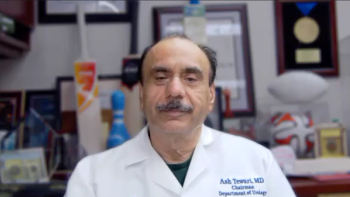
Clinical Scenario 1: A 63-Year-Old Woman With Metastatic Urothelial Carcinoma
Centering discussion on a clinical scenario of metastatic urothelial carcinoma, panelists determine which first-line regimen they would utilize prior to maintenance therapy.
Episodes in this series

Transcript:
Petros Grivas, MD, PhD: Let me move on to a clinical scenario here, so we can think about clinical practice. I will describe the case for you. A 63-year-old lady was referred to you after being evaluated for gross hematuria by the gynecologist. Very good creatinine clearance, good kidney function; cystoscopy showed a 6-cm large tumor in the bladder. The CT of the chest, abdomen, and pelvis showed evidence of pelvic lymphadenopathy, and sadly there were lung metastases at the time of diagnosis, which is not a very common scenario but can happen. Her past medical history was mild but controlled, COPD [chronic obstructive pulmonary disease], mild hypertension, good ECOG PS [performance status] of 1, no significant neuropathy, no hearing loss. PD-L1 was high per the CPS [combined positive score] of 10 or higher; the patient had Dako Omnis 22C3 antibody. And this patient, because she was fit for cisplatin, is initiated on Gem CIS [gemcitabine and cisplatin]. I don’t know if anybody would do something different, or if you agree with gemcitabine and cisplatin in that case. Srikala, any comments? You would agree?
Srikala Sridhar, MD, MSc, FRCPC: I would agree. I’m a strong proponent of gemcitabine and cisplatin based on the older data. There are some newer data saying maybe Gem Carbo [gemcitabine and carboplatin] does OK, but I would stick with gemcitabine and cisplatin if I can.
Petros Grivas, MD, PhD: I agree. Cora, would you do anything different so far, or would you continue?
Cora Sternberg, MD, FACP: With younger patients who are in really good shape, I still use MVAC [methotrexate, vinblastine, hydrochloride, and cisplatin]. More often in the neoadjuvant setting, I use dose-dense MVAC. If the patients are in really good shape and they’re young, I think that MVAC is stronger than [gemcitabine and cisplatin]. I’m still of the old school, and I see better results. But I use gemcitabine and cisplatin too, and if the patients are older or have poor creatinine or whatever, I even give split-dose gemcitabine and cisplatin. I’m not saying I don’t use it, but I do.
Petros Grivas, MD, PhD: Sure, and you have dose-dense MVAC data that have led all of us, I think, to use that, especially in the neoadjuvant setting.
Cora Sternberg, MD, FACP: Especially in the neoadjuvant setting.
Petros Grivas, MD, PhD: The question I have is, maybe Tian you can help me, how many cycles of chemotherapy do you use? Do you use 4, 5, 6 cycles, and how do you make this decision?
Tian Zhang, MD, MHS: Sure. I think on the trial, patients usually had at least 4 cycles of chemotherapy. So, I generally will rescan after 4 cycles. That gives us 3 weeks per cycle, and 12 weeks on treatment. It’s a nice time point to get a response assessment. And it kind of depends on how they’ve done over the 4 courses of chemotherapy. If they’ve tolerated it well and have had a nice response, maybe we do 2 more, for 6 cycles total. If they’ve had some dose delays, some frailty, and it has been hard to get them through 4 cycles, and they’ve done stable or well, then I’ll usually switch them at that point. But most people, by the time they get through 4 cycles and they see on scans that their tumors are shrinking, they’re very motivated to finish the 6 cycles of chemotherapy as well. I would say a majority still go to 6 cycles, and then we do the maintenance avelumab.
Petros Grivas, MD, PhD: That’s a great strategy, and I do seem to think I would scan them after 3 cycles. I think you’d do the same, Cora?
Cora Sternberg, MD, FACP: After 3 cycles, yes.
Petros Grivas, MD, PhD: And to Tian’s point, if they have a great response and tolerate the treatment well, I try to go up to 6 cycles. If they have, of course, progression, that’s a different story. But if they have struggled with toxicity, dose reduction, or they have a hard time going through, I may stop at 4 cycles and switch.
Transcript edited for clarity.
Newsletter
Stay up to date on recent advances in the multidisciplinary approach to cancer.






































